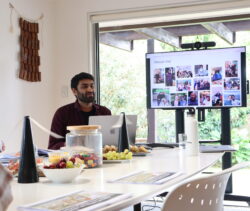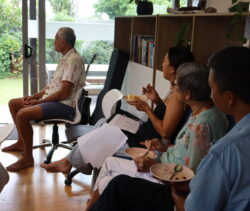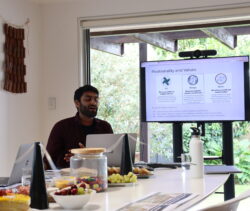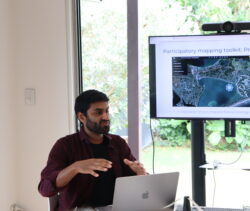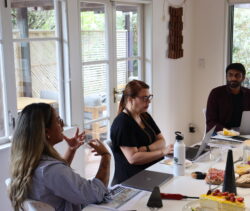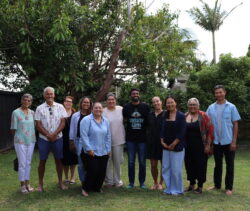Intern Spotlight: Pūrangakura hosts Milan Chuttani
Exploring reparative planning and kāinga-led climate futures with Pūrangakura.
This year, Pūrangakura was fortunate to host Milan Chuttani, a Master in City Planning student at the Massachusetts Institute of Technology’s (MIT) Department of Urban Studies and Planning. Milan joined us as an intern on the Wai Ora Kāinga Ora Project, bringing his expertise in spatial data analysis, health equity, and community planning to support our collective work on climate resilience and kāinga-led futures.
Milan (he/him) is an Indian-American urban planning practitioner whose work is deeply grounded in cultural memory and reparative justice. Born and raised in Massachusetts, on Wampanoag, Massachusett, and Nipmuc land, he carries with him layered histories of migration, displacement, and resilience. His family’s roots span Maharashtra, Karnataka, Punjab, Rajasthan, and towns now across the border in Pakistan. Like many South Asians of his grandfather’s generation, Milan’s family lived through the ruptures of Partition in 1947, an event that displaced millions under British-imposed religious divisions.
Growing up in Boston, Milan was shaped by a South Asian community that was multi-ethnic, multi-racial, and interfaith—Hindu, Muslim, Christian, and Sikh—teaching him that coexistence requires both care and solidarity. These intergenerational experiences guide his commitment to reparative planning—work that honours ancestral legacies while confronting present harms and imagining just, resilient futures.
At MIT, Milan’s research focuses on climate adaptation, housing policy, and environmental planning designed to advance reparative justice. His internship with Pūrangakura involved supporting kāinga-based research on climate resilience and emissions management, where he contributed to a range of kaupapa, including:
- Te Motu a Hiaroa Research – Reviewing masterplans, climate policies, and political contexts to situate the kāinga within broader climate planning landscapes.
- Emissions Management Resource Guide – Compiling frameworks and templates for community-led monitoring, integrating technical methods with traditional knowledge.
- Baseline Carbon Assessment – Designing approaches to measure operational and embodied emissions for kāinga wai systems, linking them to ecological sustenance like kaimoana and mahinga kai.
- Climate-Resilient Energy Precedents – Researching Indigenous and community-led models of energy innovation, from solar-agriculture to microgrids and carbon credit programs.
- Recommendations and Strategy – Proposing pathways for emissions reduction, participatory monitoring, and co-designed community tool
Recommendations and Strategy Development: Preparing opportunities for emissions reduction, proposing pathways for ongoing monitoring, and sharing participatory toolkits for mapping, co-design, and storytelling.
Alongside this, Milan also supported Ngāti Rangi ki Ngāwhā Taiao, helping with their rangatahi holiday programme and contributing to research on pāpakainga in Ngāwhā, Kaikohe, and other kāinga in Te Tai Tokerau. This work deepened his understanding of how rangatahi engagement, housing innovation, and cultural connection are central to climate resilience and community wellbeing.
Through these experiences, Milan contributed to shaping kāinga as models of climate resilience, energy sovereignty, and intergenerational strength. For him, reparative planning is not only about policy or infrastructure but about restoring relationships—between people, place, and environment—while addressing past harms and preparing for the challenges of the future.

